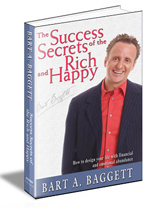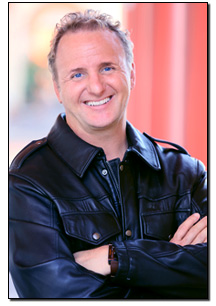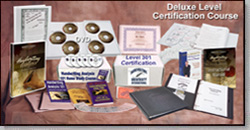Do you speak to your kids this way?
    
I remember my dad teaching me the power of
language at a very young age. Not only did my
dad understand that specific words affect our
mental pictures, but he understood words are
a powerful programming factor in lifelong success.
One particularly interesting event occurred when
I was eight.  As a kid, I was always climbing trees,
poles, and literally hanging around upside down
from the rafters of our lake house. So, it came as
no surprise to my dad to find me at the top of a
30-foot tree, swinging back and forth. My little
eight-year-old brain didn't realize the tree could
break or I could get hurt. I just thought it was fun
to be up so high. As a kid, I was always climbing trees,
poles, and literally hanging around upside down
from the rafters of our lake house. So, it came as
no surprise to my dad to find me at the top of a
30-foot tree, swinging back and forth. My little
eight-year-old brain didn't realize the tree could
break or I could get hurt. I just thought it was fun
to be up so high.
My older cousin, Tammy, was also in the same
tree. She was hanging on the first big limb, about
ten feet below me. Tammy's mother also noticed
us at the exact same time my dad did. About that
time a huge gust of wind came over the tree. I could
hear the leaves start to rattle and the tree begin to
sway. I remember my dad's voice over the wind
yell, "Bart, Hold on tightly." So I did. The next thing
I know, I heard Tammy screaming at the top of
her lungs, laying flat on the ground. She had fallen
out of the tree.
I scampered down the tree to safety. My dad later
told me why she fell and I did not. Apparently,
Tammy's mother was not as an astute student of
language as my father. When Tammy's mother felt
the gust of wind, she yelled out, "Tammy, don't fall!"
And Tammy did... fall.
My dad then explained to me that the mind has a
very difficult time processing a negative image. In
fact, people who rely on internal pictures cannot
see a negative at all. In order for Tammy to process
the command of not falling, her nine-year-old brain
had to first imagine falling, then try to tell the brain
not to do what it just imagined. Whereas, my
eight-year-old brain instantly had an internal image
of me hanging on tightly.
This is why people who try to stop smoking struggle
with the act of stopping smoking. They are running
pictures all day of themselves smoking. Smokers are
rarely taught to see themselves breathing fresh air
and feeling great. The language itself becomes one
barrier to success.
This concept is especially useful when you are
attempting to break a habit or set a goal. You can't
visualize not doing something. The only way to
properly visualize not doing something is to actually
find a word for what you want to do and visualize
that. For example, when I was thirteen years old, I
played for my junior high school football team. I
tried so hard to be good, but I just couldn't get it
together at that age. I remember hearing the words
run through my head as I was running out for a
pass, "Don't drop it!" Naturally, I dropped the ball. The only way to
properly visualize not doing something is to actually
find a word for what you want to do and visualize
that. For example, when I was thirteen years old, I
played for my junior high school football team. I
tried so hard to be good, but I just couldn't get it
together at that age. I remember hearing the words
run through my head as I was running out for a
pass, "Don't drop it!" Naturally, I dropped the ball.
My coaches were not skilled enough to teach us
proper "self-talk." They just thought some kids could
catch and others couldn't. I'll never make it pro, but I'm
now a pretty good Sunday afternoon football player,
because all my internal dialogue is positive and
encourages me to win. I wish my dad had coached me
playing football instead of just climbing trees. I might
have had a longer football career.
 Here is a very easy demonstration to teach your kids
and your friends the power of a toxic vocabulary.
Ask them to hold a pen or pencil. Hand it to them.
Now, follow my instructions carefully. Say to them,
"Okay, try to drop the pencil." Observe what they do. Here is a very easy demonstration to teach your kids
and your friends the power of a toxic vocabulary.
Ask them to hold a pen or pencil. Hand it to them.
Now, follow my instructions carefully. Say to them,
"Okay, try to drop the pencil." Observe what they do.
Most people release their hands and watch the pencil
hit the floor. You respond, "You weren't paying
attention. I said TRY to drop the pencil. Now please
do it again." Most people then pick up the pencil and
pretend to be in excruciating pain while their hand tries
but fails to drop the pencil.
The point is made.
If you tell your brain you will "give it a try," you are
actually telling your brain to fail. I have a "no try" rule in
my house and with everyone I interact with. Either
people will do it or they won't. Either they will be at
the party or they won't. I'm brutal when people
attempt to lie to me by using the word try. Do they
think I don't know they are really telegraphing to the
world they have no intention of doing it but they want
me to give them brownie points for pretended effort?
You will never hear the words "I'll try" come out of
my mouth unless I'm teaching this concept in a seminar.
If you "try" and do something, your unconscious mind
has permission not to succeed. If I truly can't make a
decision I will tell the truth. "Sorry John. I'm not sure
if I will be at your party or not. I've got an outstanding
commitment. If that falls through, I will be here.
Otherwise, I will not. Thanks for the invite."
People respect honesty. So remove the word "try"
from your vocabulary.
 My dad also told me that
psychologists claim it takes seventeen positive
statements to offset one negative statement.
I have
no idea if it is true, but the logic holds true. It might
take up to seventeen compliments to offset the
emotional damage of one harsh criticism. These are concepts that are especially useful when
raising children. My dad also told me that
psychologists claim it takes seventeen positive
statements to offset one negative statement.
I have
no idea if it is true, but the logic holds true. It might
take up to seventeen compliments to offset the
emotional damage of one harsh criticism. These are concepts that are especially useful when
raising children.
Ask yourself how many compliments
you give yourself daily versus how many criticisms.
Heck, I know you are talking to yourself all day long.
We all have internal voices that give us direction.
So, are you giving yourself the 17:1 ratio or are you
shortchanging yourself with toxic self-talk like, "I suck.
I'm fat. Nobody will like me. I'll try this diet. I'm not
good enough. I'm so stupid. I'm broke, etc. etc."
If our parents can set a lifetime of programming with
one wrong statement, imagine the kind of programming
you are doing on a daily basis with your own internal
dialogue. Here is a list of Toxic Vocabulary words.
Notice when you or other people use them.
|
But
|
Try
|
|
If
|
Might
|
|
Would Have
|
Should Have
|
|
Could Have
|
Can't
|
|
Don't
|
|
But - negates any words that are stated before it.
If - presupposes that you may not.
Would have - past tense that draws attention to
things that didn't actually happen.
Should have - past tense that draws attention to
things that didn't actually happen (and implies guilt.)
Could have - past tense that draws attention to
things that didn't actually happen but the person
tries to take credit as if it did happen.
Try - presupposes failure.
Might - It does nothing definite. It leaves options
for your listener.
Can't / Don't - These words force the listener
to focus on exactly the opposite of what you
want. This is a classic mistake that parents and
coaches make without knowing the damage of
this linguistic error.
Examples:
 Toxic phrase: "Don't drop the ball!" Toxic phrase: "Don't drop the ball!"
Likely result: Drops the ball
Better language: "Catch the ball!"
 
 Toxic phrase: "You shouldn't watch so
much television." Toxic phrase: "You shouldn't watch so
much television."
Likely result: Watches more television.
Better language: "I read too much television
makes people stupid. You might find yourself turning
that TV off and picking up one of those books more
often!"
Exercise: Take a moment to write down
all the phrases you use on a daily basis or any Toxic
self-talk that you have noticed yourself using. Write
these phrases down so you will begin to catch yourself
as they occur and change them.
| Toxic Phrase
 
Re-written Phrase
 
  |
    
-------------- End of chapter excerpt -------------------
 This chapter is an excerpt from "The Success Secrets of
the Rich & Happy," 435 page self-improvement book
relating to wealth and emotional prosperity. This chapter is an excerpt from "The Success Secrets of
the Rich & Happy," 435 page self-improvement book
relating to wealth and emotional prosperity.
Add
Rich and Happy Book to my order. |







 As a kid, I was always climbing trees,
poles, and literally hanging around upside down
from the rafters of our lake house. So, it came as
no surprise to my dad to find me at the top of a
30-foot tree, swinging back and forth. My little
eight-year-old brain didn't realize the tree could
break or I could get hurt. I just thought it was fun
to be up so high.
As a kid, I was always climbing trees,
poles, and literally hanging around upside down
from the rafters of our lake house. So, it came as
no surprise to my dad to find me at the top of a
30-foot tree, swinging back and forth. My little
eight-year-old brain didn't realize the tree could
break or I could get hurt. I just thought it was fun
to be up so high. The only way to
properly visualize not doing something is to actually
find a word for what you want to do and visualize
that. For example, when I was thirteen years old, I
played for my junior high school football team. I
tried so hard to be good, but I just couldn't get it
together at that age. I remember hearing the words
run through my head as I was running out for a
pass, "Don't drop it!" Naturally, I dropped the ball.
The only way to
properly visualize not doing something is to actually
find a word for what you want to do and visualize
that. For example, when I was thirteen years old, I
played for my junior high school football team. I
tried so hard to be good, but I just couldn't get it
together at that age. I remember hearing the words
run through my head as I was running out for a
pass, "Don't drop it!" Naturally, I dropped the ball. Here is a very easy demonstration to teach your kids
and your friends the power of a toxic vocabulary.
Ask them to hold a pen or pencil. Hand it to them.
Now, follow my instructions carefully. Say to them,
"Okay, try to drop the pencil." Observe what they do.
Here is a very easy demonstration to teach your kids
and your friends the power of a toxic vocabulary.
Ask them to hold a pen or pencil. Hand it to them.
Now, follow my instructions carefully. Say to them,
"Okay, try to drop the pencil." Observe what they do. My dad also told me that
psychologists claim it takes seventeen positive
statements to offset one negative statement.
I have
no idea if it is true, but the logic holds true. It might
take up to seventeen compliments to offset the
emotional damage of one harsh criticism. These are concepts that are especially useful when
raising children.
My dad also told me that
psychologists claim it takes seventeen positive
statements to offset one negative statement.
I have
no idea if it is true, but the logic holds true. It might
take up to seventeen compliments to offset the
emotional damage of one harsh criticism. These are concepts that are especially useful when
raising children. Toxic phrase: "Don't drop the ball!"
Toxic phrase: "Don't drop the ball!" Toxic phrase: "You shouldn't watch so
much television."
Toxic phrase: "You shouldn't watch so
much television."






